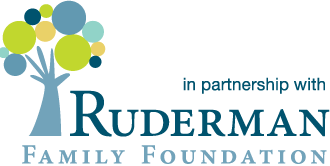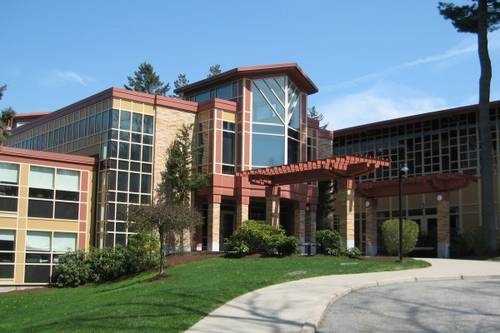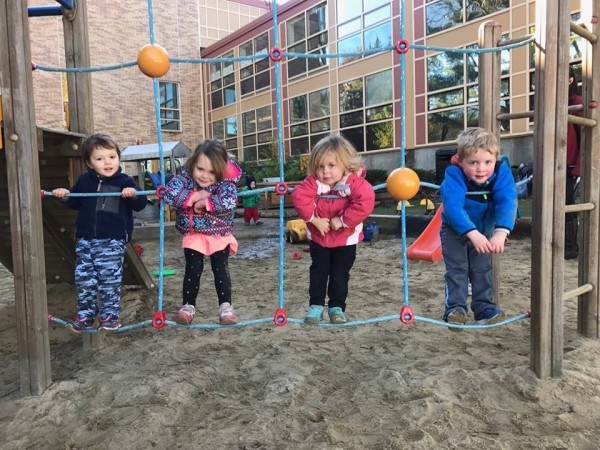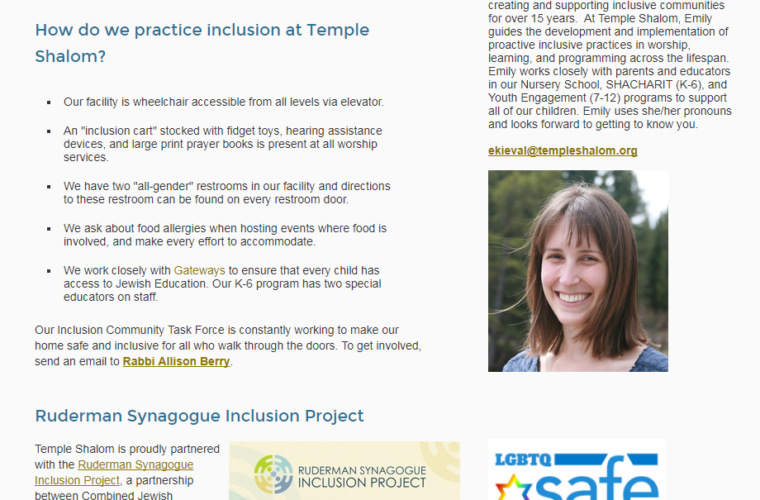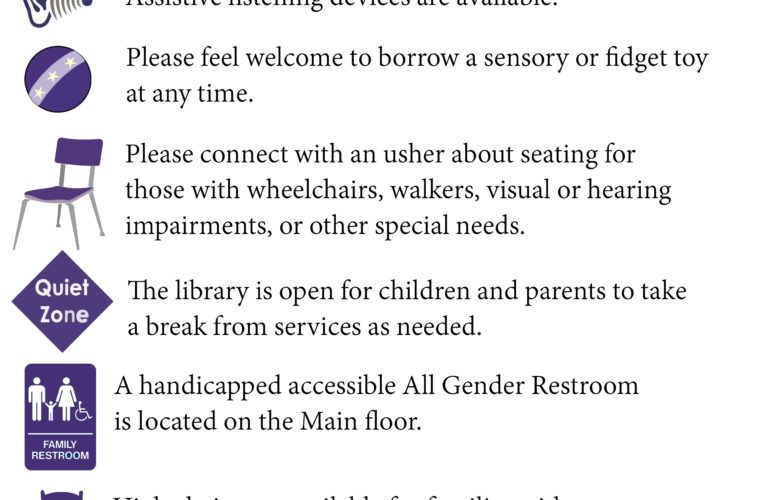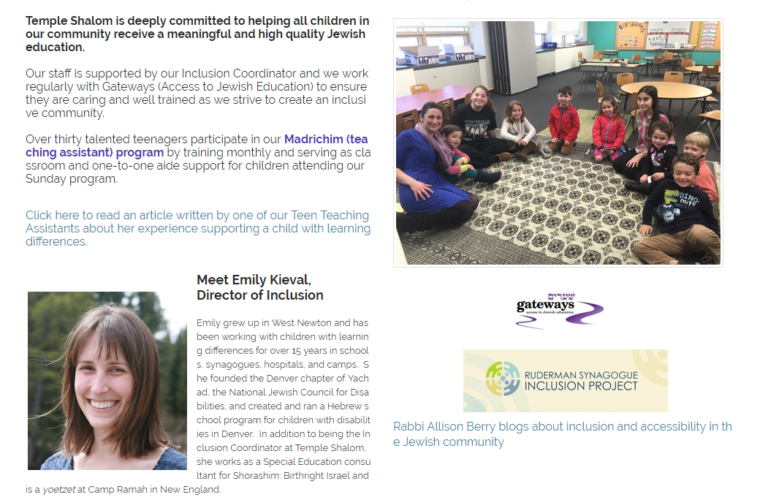Areas of Inclusion: Adults in Communal Life, Advocacy & Community Partnerships, Architectural & Physical Accommodations and Transportation, Autism, B’nai Mitzvah, Early Childhood Education, General Inclusion, Mental Health, Parents of Children with Disabilities, Religious School, Worship, and Youth Group, High School, and College Programming
Contact Information
Allison Berry
Inclusion Programming
Does this congregation have an inclusion committee?
Yes
Developing Our Program
Temple Shalom has always been conscious of the diverse needs of our temple community- from our youngest learners in our nursery school to our very large and active seniors- and has engaged in efforts to promote inclusion and involvement. In early 2015, we invited congregants to join our Inclusive Community Task Force so we could address issues of inclusion and diversity more strategically and holistically. Rabbi Allison Berry has been an active and enthusiastic leader of the community and continues to inspire and encourage the committee and congregation to transform the culture of our community to be a model of inclusion.
The Inclusive Community Task Force has developed a four-part strategy for implementing our vision of an Inclusive Community. Working groups are implementing initiatives in each area:
• Communications and Vision: increasing access to information for people with disabilities; updating disability language on our website and materials; changing the language on our membership materials and school applications; training of ushers, clergy and staff; improving signage; and offering opportunities for people with disabilities’ voices to be heard.
• Youth Engagement and Education: Raised the money and created a budget to create the role of Director of Inclusion. Our Director currently works for Temple Shalom 32 hours/week and supports staff, children in families in nursery school and Grades K-8. We have also improved our madrichim (teen teaching assistant) selection process, training and support; re-engineered b’nai mitzvah process for students with learning differences; new intake process for children into our education programs; integrated special needs supports into family events; increased professional aides; specialized hebrew instruction for pre-b’nai mitzvah children with learning differences; parent support group; special inclusion oriented programming for school aged children.
• Worship: “Inclusion cart” at all worship services; usher training; laminated accessibility and inclusion sheets; transportation for seniors; sound system improvements; vision and hearing supports; quiet rooms; special accommodations during high holidays.
• Senior and Adult Engagement: programming; overview of food policies to accommodate food sensitivities at all temple events, oneg and dinners; outreach to seniors. We have recently launched a new mental health initiative to help mitigate stigma and better educate our community about those in need.
Number of people involved in the effort: 50
Involving People with Disabilities
We have included all “stakeholders” in the planning and execution of our inclusion efforts. It is important to our congregation that participation be community-wide. Several adults with both visible and invisible disabilities have worked with the committee, educators, clergy and staff to set the inclusion agenda and implement our short- and long-term plans.
Funding This Effort
The Temple Shalom board has been extremely supportive of inclusion efforts for the congregation and has increased spending on inclusion every year. This year, the board approved funding for a full-time inclusion director for our religious school. The Sisterhood has also been a generous partner for these efforts, helping to finance inclusion staff and to partner on programs for the community on important topics such as mental health.
Temple Shalom is proudly partnered with the Ruderman Synagogue Inclusion Project, a partnership between Combined Jewish Philanthropies and the Ruderman Family Foundation to support synagogues in creating communities where people of all abilities are valued equally and participate fully.
Helpful Agencies & Organizations
Ruderman Synagogue Inclusion Project, a partnership between Combined Jewish Philanthropies and the Ruderman Family Foundation to support synagogues in creating communities where people of all abilities are valued equally and participate fully.
We work closely with Gateways: Access to Jewish Education to ensure that every child has access to Jewish Education. Our K-6 program has two special educators on staff.
Spreading Awareness About Our Work
Our commitment to inclusion is expressed in this statement that appears on our website and in our communications:
Temple Shalom is deeply committed to inclusive Jewish education, programming, and worship and welcoming and supporting all members of our sacred community.
Within our congregation, communication has been a priority. Presentations on our inclusion initiatives have been included in board meetings and at our annual sustaining members event for congregants. T High Holiday and Shabbat ushers have received inclusion training and are supported with materials that are available at synagogue events and programs (the Inclusion Cart is available at the entrance for all worship and laminated Inclusion Sheet is distributed in the sanctuary). All of our registration materials for events, religious school and membership have clear inclusive language. Signage is visible and appropriate.
Externally, Temple Shalom members have spoken eloquently about how welcoming and inclusive our community has become. At the May 2017 Ruderman Inclusion Event, one of our members, an adult with autism who volunteers at the synagogue, spoke about his experience as an important part of Temple Shalom. Rabbi Berry’s articles on inclusion have received national attention.
Process & Sharing
Marketing Documents Indicating Our Commitment to Inclusion
History, Materials & Processes that Guided Our Approach
We are happy to share with others information about Madrichim training, parent and sibling support groups, multi-sensory Hebrew reading methodology, programs we have created such as the Alyson Gerber book program (see flyer attached to this application). In particular members of our community have developed trainings for both staff and our board on inclusion that were very well received. We are happy to share this information, how we trained people and what we have learned. Our Director of Inclusion is always available to consult. Rabbi Berry is happy to share resources and ideas about how to introduce the idea of inclusion on the Bimah, through teaching and at the Board level. We are also attaching a presentation created for our capitol campaign to raise money in our community for inclusion staff and resources. Also shared here is Rabbi Berry's Rosh Hashanah sermon delivered just a few weeks ago on building an inclusive community.
History, Materials & Process Documents
Evidence of Successful Inclusion Efforts
Our education program for Grades K-6 is growing each year. Many of the new families and children who are joining our congregation are doing so because they know we will support their children, help them make friends and truly be a caring and supportive place. We now have a reputation in Boston of offering excellent, inclusive education and support. Much of the thanks we receive are confidential in nature due to family's personal situations and needs.
Evidence of Changing Attitudes
There is a growing understanding that inclusion is good for everyone. More inclusive practices mean everyone feels more welcomed, seen and supported. This is the continued conversation moving through our community. This also includes how we see and welcome interfaith families.
How We're Using and Sharing the Disabilities Inclusion Learning Center
We look forward to being part of a broader Jewish community that cares about inclusion. We would love to share resources and learn from others especially around mental health support and creating more inclusive worship.
Future Inclusion Efforts
We have set some new goals this year of developing a sensory friendly family service for children and families that do not feel comfortable at our regular Shabbat and Sunday morning family services. In addition we will be offering workshops on supporting seniors and aging parents. Finally, our mental health initiative is really taking off -we have a committee actively meeting and starting to plan programming and working to create community partnerships. We are also working to secure funding to move our Director of Inclusion role to a full-time position.

